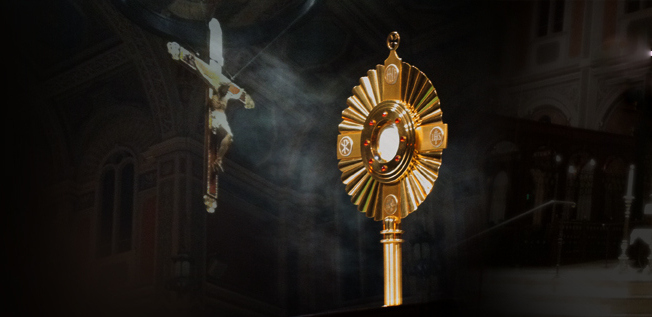The Dogmatic Constitution on the Church from the Second Vatican Council (see Lumen Gentium No.11) concisely stated that Eucharist is the source and summit of Christian life. The Catechism of the Catholic Church also reiterates the same. Nevertheless, it explains further how the Eucharist is the summit: “The other sacraments, and indeed all ecclesiastical ministries and works of the apostolate, are bound up with the Eucharist and are oriented toward it. For in the blessed Eucharist is contained the whole spiritual good of the Church, namely Christ himself, our Pasch.” (CCC #1324)
The Greek word eucharisteo means “to give thanks.” Accordingly, the eucharistic celebration is a prayer of thanksgiving: The priest invites the participants in the Mass, saying, “Let us give thanks to the Lord our God” and the congregation replies, “It is right and just.” Further, during the consecratory prayer, the priest says, “He took bread and giving thanks, broke it … in a similar way, … he took the chalice and once more giving thanks, he gave it to his disciples … .” (see 2nd Eucharistic Prayer; Lk 22:19; 1 Cor 11:24) Hence, the Catechism of the Catholic Church describes the Liturgy of the Eucharist as “consecratory thanksgiving.” (CCC #1346)
During the celebration of the Mass, the bread and wine are transformed by the power of the Holy Spirit and through the instrumentality of the priest into the body and blood of Jesus Christ. Christ is thus truly, substantially and really present under the appearance of bread and wine. This transformation is called transubstantiation. The Council of Trent, in its 13th session, defined transubstantiation as a doctrine of Faith: “By the consecration of the bread and wine there takes place a change of the whole substance of the bread into the substance of the body of Christ Our Lord and of the whole substance of the wine into the substance of his blood.” (canon 1) Centuries earlier, St. Thomas Aquinas explained that a total change in the substance of bread and wine occurs, while the outward appearance, or the “accidents,” remain the same.
During the celebration of the Mass, the bread and wine are transformed, by the power of the Holy Spirit and through the instrumentality of the priest, into the body and blood of Jesus Christ.
By His Real Presence in the Eucharist, Jesus fulfills His promise to be with us until the end of the age. (cf. Mt 28:20) Hence, after the distribution of holy Communion, the remaining consecrated hosts are retained in the tabernacle, to be used later either for the faithful or for the sick and also for solemn eucharistic adoration. We have a great need for eucharistic adoration, because Jesus is waiting to strengthen, comfort and give us solace.
The Eucharist, also called holy Communion, is a sacrament of unity. It unites us more closely with Jesus: “He who eats my flesh and drinks my blood abides in me, and I in him.” (Jn 6:56) By receiving the body and blood of Christ from the same table, the faithful become one body of Christ. St. Paul highlights this unity by saying: “Because there is one bread, we who are many are one body, for we all partake of the one bread.” (1 Cor 10:17) In this unifying sacrament, Christ unites us to Himself and with one another. (CCC #1396) He strengthens our love for one another, enables us to sacrifice ourselves for the good of others and inspires us to eliminate all prejudices and obstacles that obstruct our fraternal love. Those who fail to understand this aspect of agape, namely, expression of love, receive the Eucharist unworthily. St. Paul warns such people: “Whoever eats the bread or drinks the cup of the Lord in an unworthy manner will be guilty of profaning the body and blood of the Lord.” (1 Cor 11:27)
Another distinctive aspect of the Eucharist is that it is a meal. Jesus instituted the Eucharist at the Last Supper. During this final meal, Jesus blessed the bread and wine and said, “This is my body … This is my blood.” (Mt 26:26-28; Mk 14:22-25; Lk 22:14-20; 1 Cor 11:23-26) At the end, He instructed His disciples to do the same in memory of Him. Hence, the holy Mass we celebrate is a re-enactment of the Last Supper. Just as material food nourishes us to grow physically, the Eucharist provides essential nourishment for our spiritual life. (Jn 6:48-51) Jesus Christ is the bread that came down from heaven so that we may have life. (Jn 6:58) Let us, therefore, understand the true value of the Eucharist and be nourished to grow with Christ and with one another.
Father Arul Joseph Visuvasam
Pastor of St. Peter and St. Casimir Parishes in Stevens Point
Published in the April 2022 Issue of Catholic Life Magazine

